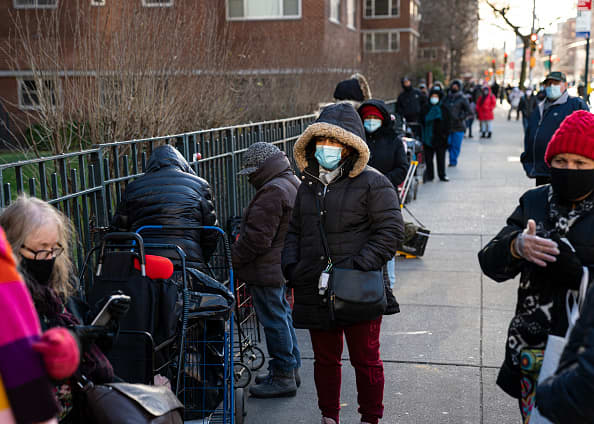People wait in line at the Holy Apostles Soup Kitchen on Dec. 15, 2020 in New York City.
Robert Nickelsberg | Getty Images
Finally, there’s some good news for the millions of people on two key unemployment programs that expired before President Donald Trump signed the latest Covid relief bill — they likely will not miss out on a week’s worth of benefits.
The programs, formally known as Pandemic Unemployment Assistance and Pandemic Emergency Unemployment Compensation, technically lapsed Saturday, a day before Trump signed the $900 billion package extending them. It was thought that because of this, millions on the programs would lose one week of benefits.
But according to the U.S. Labor Department, the timing of the bill should not lead to such a gap.
More from Invest in You:
7 money moves to make now to start the new year strong
Trump signs off on $600 checks; vote on $2,000 payments still happening
The steps you need to take to prepare for financial emergencies in 2021
“As states are implementing these new provisions as quickly as possible, the Department does not anticipate that eligible claimants will miss a week of benefits due to the timing of the law’s enactment,” a spokesperson from the Labor Department said in a statement.
That’s a big deal for the roughly 14 million people on PUA and PEUC. “We got a Christmas miracle a little late I guess,” said Michele Evermore, a senior policy analyst at the National Employment Law Project.
More details to come
So far, Rhode Island, New Jersey, Connecticut, Massachusetts, California and Washington state have announced that residents on PUA and PEUC will not see a gap in benefits, and more are likely to follow.
“I totally expect that all states will end up paying this gap week,” said Evermore.
In addition, the extra $300 per week established in the new bill will resume and run for the week beginning after Dec. 26 through March 14, 2021, the same timeline as the other extended benefits, per the Labor Department. Because states have operated these programs before, and many core features are the same, previously issued guidance will remain effective, the department said.
At least five pieces of guidance will come soon from the Labor Department’s office of Unemployment Insurance, to assist states in setting up the programs. Implementation timelines will vary by state, and new provisions and changes to state-run benefit programs will also require adequate testing before rollout, according to the spokesperson.
There will be backpay for some
To be sure, some people may still see a gap in when benefits are paid due to the new bill. But, they will be getting back pay for weeks in which they were eligible for unemployment insurance.
“There is no break in benefit accrual, but there may be a break in benefit payment,” said Evermore. States will have to make some changes to their unemployment programs, including implementing a new one for mixed earner unemployment compensation, that will take guidance from the Labor Department and time to stand up.
“What I expect is that in two or three weeks, people will get a benefit that’s two to three weeks’ worth,” said Evermore.
— CNBC’s Greg Iacurci contributed reporting.
SIGN UP: Money 101 is an 8-week learning course to financial freedom, delivered weekly to your inbox.
CHECK OUT: Suze Orman: Don’t pay off debt with a second stimulus check — here’s your ‘first priority’ via Grow with Acorns+CNBC.
Disclosure: NBCUniversal and Comcast Ventures are investors in Acorns.
